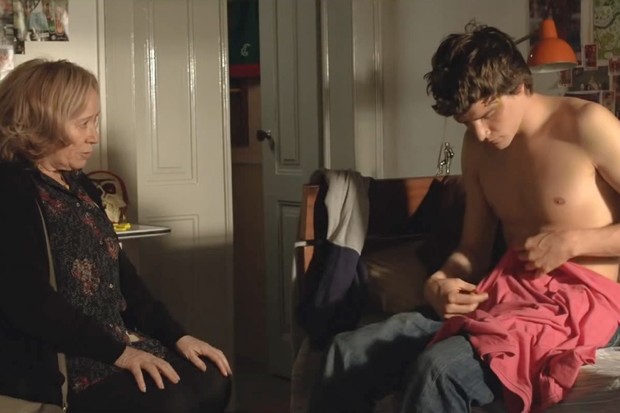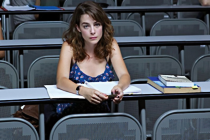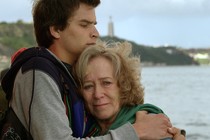Os Gatos Não Têm Vertigens: solitude is similar to solidarity
by Vitor Pinto
- Veteran actress Maria do Céu Guerra stars in the new film by António-Pedro Vasconcelos

Maria do Céu Guerra is one of the most highly renowned Portuguese actresses; her reputation has mainly been built up through her theatre work, a far cry from television and the silver screen. Now, at 71 years old, and after a few sporadic forays into the seventh art, the actress has finally managed to land a major film role, as if her character in Os Gatos Não Têm Vertigens (lit. “Cats Don’t Have Vertigo”), which is released this week, were a dress tailor-made for her talent.
In the movie, she throws everything she has into building the character of Rosa, a widow who tries to get over her solitude by talking to the ghost of her recently deceased husband (Nicolau Breyner). One day, that solitude is shattered when she finds Jó (João Jesus) asleep on the balcony of her flat. Jó is 18, and his problematic father has just thrown him out of the house. Rosa decides to take him in, and a kind of intimacy starts to develop between the two of them that will confuse everyone… apart from them.
Director António-Pedro Vasconcelos glides between a number of genres with great ease. His two latest movies were the thriller Call Girl [+see also:
trailer
film profile] (2007) and the romantic comedy Beauty and the Paparazzo (2010). With Os Gatos Não Têm Vertigens, he is back brandishing a film with a social awareness, something that he had already been interested in back in 1999 when he filmed Jaime, set against a backdrop of child labour.
Now he is doing the same again, directing a predictable – but nonetheless touching – story of personal involvement at a time of crisis, which the promotional campaign is trying to sell as a kind of Portuguese Harold and Maude.
Boasting a highly effective screenplay written by Tiago Santos, the film is actually a tale of elderly solitude and intergenerational solidarity. During the dictatorship, Rosa’s character was arrested and tortured by the police run by the regime at that time. Now, over 40 years later, this woman embodies, in her ageing body, every single ideal of freedom and solidarity from the Carnation Revolution, and by helping Jó out, what she is doing is fulfilling those same ideals on a personal level; ideals that 40 years of democracy did not manage to implement completely on a social level.
Alongside the majestic Maria do Céu Guerra is a promising newcomer, 23-year-old João Jesus, who is completely believable as he transforms from a social outcast into a young, gifted author. The close relationship between the two main characters brings the film through to its successful conclusion – a film that sets its sights on the path of altruism in order that the world might become a less unfair place.
Produced by Tino Navarro for MGN Filmes, Os Gatos Não Têm Vertigens is hitting screens during an unusual month for Portuguese cinema, which has seen the release of no fewer than five domestic features. Following Os Maias [+see also:
film review
trailer
film profile], Alentejo, Alentejo, I Love Kuduro and Os Gatos Têm Vertigens, the fifth is the experimental title Lacrau by João Vladimiro, which also comes out this week in one Lisbon cinema.
Navarro, who produced Sei Lá [+see also:
trailer
film profile], Portugal’s most-seen movie of the year so far, is hoping that Os Gatos Não Têm Vertigens will be just as popular with audiences.
(Translated from Spanish)
Did you enjoy reading this article? Please subscribe to our newsletter to receive more stories like this directly in your inbox.

























